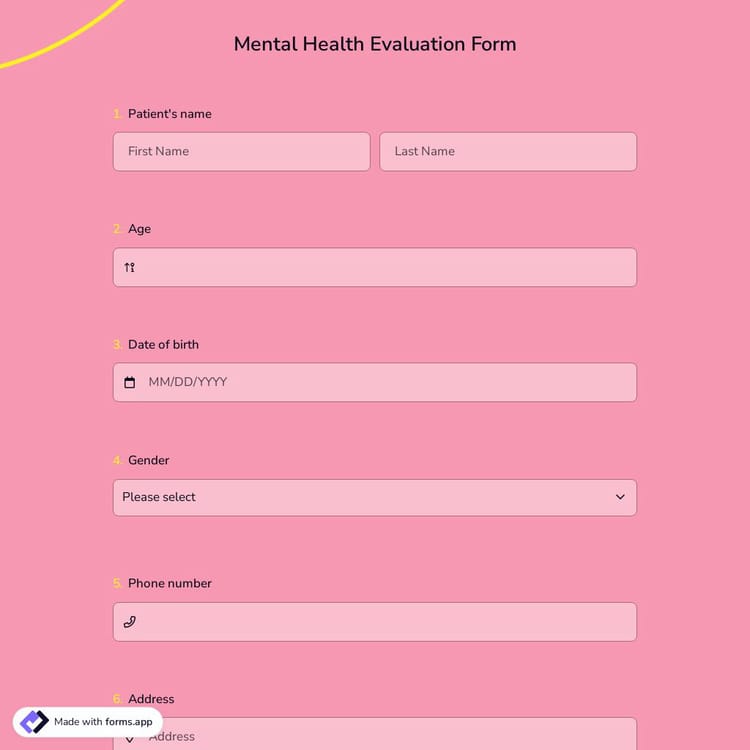Mental Health Evaluation Form
Mental health evaluation forms are used to help evaluate and track the mental health of an individual. The form can be filled out by a mental health professional or by the individual themselves. By using this free mental health evaluation form template today, create your own form in minutes.
What is a mental health evaluation form?
A mental health evaluation form is a document used to assess an individual's mental health. It can be used to help identify any potential mental health concerns, as well as to track the individual's progress over time. These evaluation forms are mainly used to identify areas that need improvement, monitor progress, and track treatment goals.
Mental health evaluations can be conducted by a variety of professionals, including psychiatrists, psychologists, and social workers. If you are providing mental health services, you may ask your new patients to complete a mental health evaluation form online before the appointment. Alternatively, you can create a form for yourself to fill out during or after the sessions.
What should a mental health evaluation form include?
An online mental health evaluation form typically includes questions about the individual's symptoms, thoughts, and behaviors. It may also ask about the individual's family history of mental illness, as well as any personal experiences with mental health issues. You can easily customize this form sample to add your own questions and assess the situation better. Here are some of the information you may want to collect by adding questions to your assessment form:
- Personal information: Name, address, phone number, email address.
- Reason for seeking assistance: Family history of mental illness, personal experience with mental illness, or other reasons.
- Medications: List of current medications and dosages.
- Brief medical history: Any relevant medical conditions, surgeries, or hospitalizations.
- History of mental health treatment: Any previous therapy, medication, or other treatment received for mental illness.
- Mental health symptoms: A list of current symptoms, how long they have been present, and their severity.
- Social support: A list of people who provide emotional support, practical help, or both.
- Living situation: Information about where the individual lives, whether they live alone or with others, and any support they receive from roommates or landlords.
- Employment status: Information about the individual's current job situation, including whether they are employed, unemployed, or disabled.
- Financial situation: Information about the individual's current income, debts, and assets.
- Legal history: Any brushes with the law, including arrests, convictions, and probation.
- Substance use: Information about the individual's use of alcohol, drugs, tobacco, and other substances.
- Mental health diagnosis: The individual's current diagnosis, if any.
- Treatment goals: A list of goals for treatment, including short-term and long-term goals.
- Discharge planning: Information about the individual's plans for after they leave treatment, including housing, employment, and social support.
Frequently asked questions about Mental Health Evaluation Form?
An evaluation form is a document that poses a series of questions for assessing an event, product, service, employee, or course. Evaluation forms can be created and used for many purposes, such as performance reviews, collecting feedback, assessing professional development, and so on.
Whether you create a form for assessing employee performance, customer satisfaction, teacher evaluation, or a self-evaluation, it helps form takers to reflect on recent events and make an assessment of the event, their colleagues, or themselves. Overall, here are the benefits of using online forms for evaluation:
- They help businesses to get employee feedback
- They make the evaluation process easier
- They help you collect data automatically and in real-time
A typical evaluation form includes various form fields to get people’s opinions in the best way possible. These form fields can be, for example, selection fields, text fields, rating scales, etc. In addition to your assessment form questions, it is also possible to use form fields to collect essential details, such as name, department, or contact information. However, you may avoid these questions to give your respondents anonymity, based on your policies.
As a powerful form builder, forms.app provides all of the necessary fields and allows you to ask questions in any way you want. For instance, you can provide your respondents with pre-given given responses with selection fields or get detailed responses by asking open-ended questions.
To create your own form, you need a form creator tool, like forms.app here. With its easy-to-use interface, robust features, and evaluation form examples, forms.app allows you to create your own review forms without any coding. All you have to do is sign in to your account and follow the steps below:
- Open a free form template or create a blank form
- Add your questions for the assessment while you are on the edit tab
- Customize your form design for your brand or organization
- Adjust the form settings
- Preview your form before sharing it with your audience
- Lastly, share your form or embed it on a web page
Categories
This mental health evaluation form is free and customizable
Categories